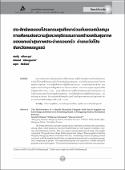บทคัดย่อ
ผลการทดลองพบว่ากลุ่มทดลองมีการเปลี่ยนแปลงความรู้เกี่ยวกับพฤติกรรมสร้างเสริมสุขภาพ การรับรู้โอกาสเสี่ยงของการเกิดโรคจากพฤติกรรมสุขภาพ การรับรู้ความรุนแรงของโรคจากพฤติกรรมสุขภาพ การรับรู้ผลดีของการปฏิบัติตามคำแนะนำ,แรงสนับสนุนทางสังคม และพฤติกรรมสร้างเสริมสุขภาพได้ถูกต้องมากกว่าก่อนการทดลอง และมากกว่ากลุ่มควบคุมอย่างมีนัยสำคัญทางสถิติ (ค่าพี < 0.05) นอกจากนี้ยังพบว่าความรู้เกี่ยวกับพฤติกรรมสร้างเสริมสุขภาพ การรับรู้ความรุนแรงของโรคจากพฤติกรรมสุขภาพ การรับรู้ผลดีของการปฏิบัติตามคำแนะนำ แรงสนับสนุนทางสังคม มีความสัมพันธ์กับพฤติกรรมสร้างเสริมสุขภาพของแกนนำสุขภาพประจำครอบครัวอย่างมีนัยสำคัญทางสถิติ (ค่าพี < 0.05)
บทคัดย่อ
The living behaviors of people change in line with their economic and social status,
among others, often leading to incorrect health behavior with regard to nutrition, exercise,
and elimination of stress. This was a quasi-experimental research study. The sample
comprised 120 people from village 4 Banwangyai and village 5 Banwangplub is Tambon
Wanghin, Wangpong District, Petchabun Province. A multistage random sampling method
was used, with the sample divided into an experimental group and a comparison group,
each comprising 60 people. The experimental group was exposed to a health education
program with social support. The research instruments for data collection were questionnaires assessing knowledge of health-promotion behavior concerning susceptibility to
various types of diseases caused by behavior, severity of the diseases, social support by
public health volunteers, and health promotion behavior, among others. The statistical
methods used were means, standard deviation, paired-sample t-test, student’s t-test, and
Pearson’s correlation coefficient.
The findings showed that the experimental group had higher scores than the comparison
groups on these aspects following the program and the increase was statistically
significant.


